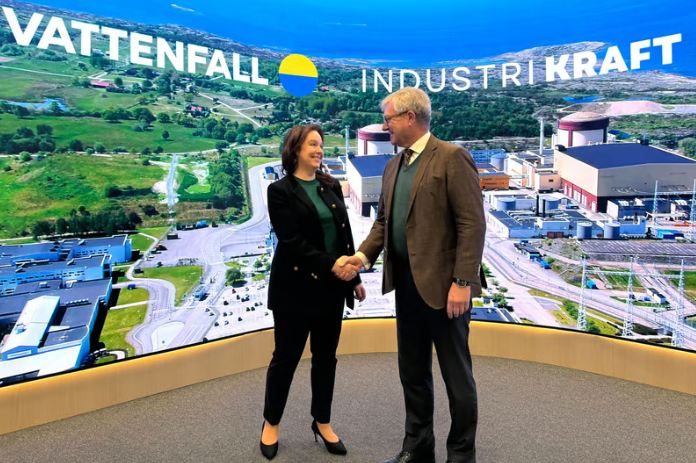Sweden’s industrial sector is deepening its commitment to fossil-free power as Vattenfall and Industrikraft in Sweden AB sign a joint investment agreement to advance the development of new nuclear power on the Värö Peninsula near Ringhals.
Under the new agreement, Industrikraft, a consortium formed in 2024 and comprising ABB, Alfa Laval, Boliden, Hitachi Energy, Höganäs AB, SSAB, Saab, Stora Enso, and the Volvo Group, will acquire a 20% stake in Videberg Kraft AB, the project company established by Vattenfall to drive nuclear expansion at Ringhals. Industrikraft’s initial investment of SEK 400 million will help fund project development and feasibility work, with additional resources and technical expertise drawn from the consortium’s industrial network.
The move comes amid a wider European reassessment of nuclear power’s role in the clean energy transition. With Sweden targeting a 100% fossil-free electricity system by 2040, new baseload capacity is increasingly viewed as essential to sustain the rapid electrification of steelmaking, heavy manufacturing, and transport. Yet, Sweden’s nuclear roadmap faces both regulatory and financial challenges: the country’s last new reactor was commissioned more than four decades ago, and new builds must navigate a complex permitting landscape and uncertain cost environment.
Anna Borg, CEO of Vattenfall, described the partnership as a crucial demonstration of industrial demand for low-carbon power. “It is very positive news that Vattenfall and Industrikraft are now taking the next step to move the project forward together. The industry is an important partner in enabling new nuclear power in Sweden. The commitment and willingness of these companies to co-own the project on the Värö Peninsula is a sign that there will be a demand for the new fossil-free electricity production capacity. In the next step, Videberg Kraft AB is working to prepare an application for state risk-sharing”, says Anna Borg.
For Industrikraft, the decision represents both strategic alignment and self-interest. Energy-intensive companies such as SSAB and Volvo face mounting pressure to decarbonize production lines while maintaining global competitiveness. By participating directly in energy generation, Industrikraft’s members aim to secure stable, predictable electricity prices and contribute to the long-term resilience of Sweden’s energy system.
The project’s location at Ringhals, already home to four reactors, two of which remain operational, provides a practical foundation for expansion. The site benefits from existing grid infrastructure and a skilled local workforce, both of which reduce entry barriers. However, the project’s success hinges on whether Sweden’s regulatory and financing frameworks can evolve to support next-generation reactor designs, including small modular reactors (SMRs), which Vattenfall has been evaluating as part of its future portfolio.
Stay updated on the latest in energy! Follow us on LinkedIn, Facebook, and X for real-time news and insights. Don’t miss out on exclusive interviews and webinars—subscribe to our YouTube channel today! Join our community and be part of the conversation shaping the future of energy.
